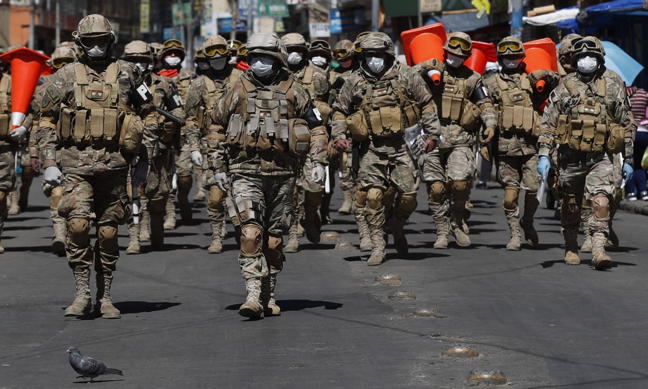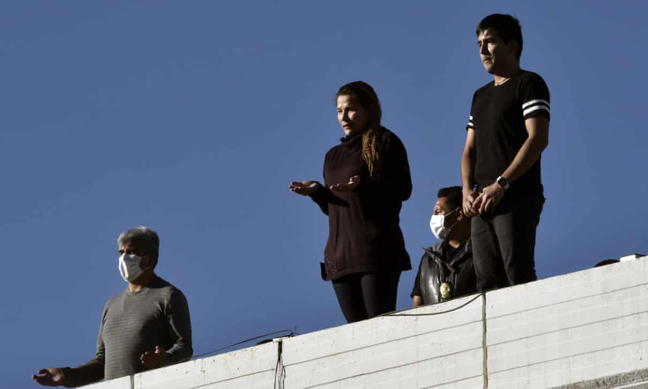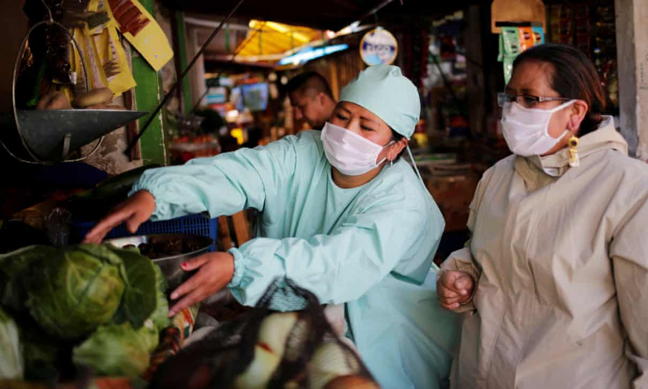
Is Bolivia's 'interim' president using the pandemic to outstay her welcome?
June 1, 2020 - Original aticle: The Guardian
Laurence Blair
As locked-down Bolivians looked to the skies this Easter, they were met with an unusual sight. Cassock-wearing priests, some wielding statues of the apostles, sprinkled holy water and blessings over four cities from circling air force helicopters.
The episode encapsulated the uneasy mix of militarism and religious zeal that has defined six months of the caretaker presidency of Jeanine Áñez. A little-known evangelical politician from Bolivia’s tropical lowlands, Áñez was catapulted to power last November with one job: to hold new elections as soon as possible.
The long-running presidency of Evo Morales had transformed the Andean-Amazonian country, bringing many of the indigenous majority out of poverty. But it ended in violent demonstrations, a police mutiny, and pressure from the army to step down amid allegations of electoral fraud.
Morales and other senior figures from his Movement for Socialism (Mas) resigned and fled, and Áñez – as second vice-president of the senate – assumed interim rule pledging to “rebuild democracy”.
Six months on, even critics of Morales argue that the 52-year-old has instead deepened divisions in the multi-ethnic nation of 11 million people – and is using the coronavirus pandemic to further her own political ambitions.
“The installation of the Áñez government has been marked by the blood of Bolivians,” said Valeria Silva Guzmán, a former Mas congresswoman now claiming asylum in Mexico. “Deaths, prison, repression, political persecution … it’s basically a regime of terror.”
(below) Bolivia’s interim president, Jeanine Áñez, centre, prays on a rooftop as Monsignor Fernando Bascope leads a Good Friday procession on a truck through the streets of La Paz on 10 April. Photograph: Aizar Raldes/AFP via Getty Images

One of Áñez’s first acts was to authorise the use of lethal force by police and soldiers. The decree was later rescinded, but security forces meanwhile killed up to 28 demonstrators, including in two shootings widely described as massacres. The killings are yet to be investigated.
In January, Áñez declared her own candidacy for president in the forthcoming elections – a U-turn on her previous promises. She has since postponed the polls originally scheduled for 3 May, arguing they should wait until the worst of the pandemic has passed, which has so far seen more than 8,000 cases in Bolivia and 293 confirmed deaths.
Áñez imposed a stiff quarantine on 17 March to stop Bolivia’s underfunded hospitals being swamped – and called for “fast and prayer” to beat the coronavirus. But with lockdown measures easing dramatically from 1 June, even as cases have suddenly erupted in Añez’s home province of Beni, some question the rationale for postponing the electoral rerun until September or beyond. Schools will remain shut and public events banned – but church services will be allowed to resume at 30% capacity.
“Now we’re queueing up for the bank, there are big crowds everywhere to get into the supermarket,” said Miguelángel Estellano, an artist. “The health crisis is helping the government create a camouflaged state of martial law.”
At least 56 countries worldwide have delayed elections because of Covid-19. But under Áñez such a move has fuelled denunciations of a power grab. Her administration has leaned on prosecutors to bring corruption, sedition and terrorism charges against dozens of former Mas officials and supporters. Leftwing journalists have been harassed and detained.
Last month, generals in combat uniforms barged into the senate, demanding that the Mas-majority body approve promotions awarded by the Áñez administration.
Arturo Murillo, her hardline interior minister, has threatened to deploy fighter jets to the Chapare – a coca-growing region and Mas stronghold – to take on alleged narcotraffickers.
A new law threatening those who “misinform or cause uncertainty” over coronavirus with up to 10 years in jail – with Murillo warning the Mas presidential candidate, Luis Arce, by name – was dropped earlier in May following international outcry.
Áñez has been “a disappointment”, said Eduardo Rodríguez Veltzé, a Bolivian judge and former diplomat. “Instead of establishing a tolerant environment that guarantees free and fair elections, she decides to become a candidate, make a show of persecuting and dismantling the Mas, and govern in an opaque, abusive and openly ideological way,” he argued.
Rodríguez – who served as Bolivia’s caretaker president for six months in 2005 to 2006 after a similarly dramatic political crisis – said such moments called for consensus-building. Restoring calm, and organising the elections that first brought Morales to power, “was only possible with a neutral referee, who wasn’t tempted to enter the electoral game with the advantage of holding the whistle”, he added.
The Áñez administration has instead kicked out Cuban doctors, re-established ties with Israel, abandoned leftwing regional forums, and courted Donald Trump’s White House. Such abrupt about-turns in Bolivia’s foreign policy show that her priority is to “restore neoliberalism under the paradigm of Latin America as the backyard of the United States”, Silva argued.
At least 13 corruption cases have emerged in the past six months, including in the state oil, telecoms and aviation firms, and medical officials have allegedly used the pandemic to line their pockets.
(below) Reina and Cecilia Gutierrez, wearing protective clothing, are seen at a market amid the coronavirus outbreak in La Paz, Bolivia, this month. Photograph: David Mercado/Reuters

The health minister was arrested and fired in May after Bolivia imported 179 ventilators – which doctors later found were incompatible with intensive care units – for almost $5m, nearly three times their market price. In response to the scandal, Áñez promised to “impose all the force of the law” on those found guilty of corruption. Police have since detained the judge presiding over the case.
Analysts suggest that weak institutions and widespread corruption are partly a legacy of Mas and its predecessors – and that Áñez’s persecution of critics mirrors tactics employed by Morales.
“The current administration has followed the Mas playbook when it comes to lawfare,” argued Jorge Derpic, a sociology professor at the University of Georgia, comparing the current raft of terrorism cases against Mas officials to how Morales wielded similar charges to intimidate, arrest and exile opponents.
Mas – whose supporters still answer to Morales, now in exile in Argentina – has a role to play in calming tensions, Derpic added.
“We could have taken better decisions in many things,” admitted Silva. “But it’s a risk to enter into this debate right now, when we see the great advances Bolivia has made being rapidly rolled back, and when there is no rule of law.”
The road ahead for Bolivia looks “very difficult”, said Rodríguez. He argued that the three successive emergencies – widespread fires across the Bolivian Amazon last year, the electoral crisis and the pandemic – have shown the need for a new constitutional reform to limit presidential powers, strengthen the judiciary, tackle poverty and protect the environment.
Luisa Elba Sanjinés, 59, a street trader who sells vegetables on the outskirts of La Paz, said both her customers and rural suppliers were fearful after months of upheaval. Government grants for those affected by lockdown had not reached her.
“We need to get out of this illness and be able to work, because many people have nowhere to go,” Elba said.
Áñez “should hold dialogue and speak with everyone”, she added. “People just want the election to be over with.”